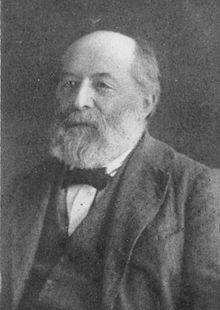Albert Chavannes | |
|---|---|
 | |
| Born | Albert Chavannes February 23, 1836[1] Lausanne, Switzerland[2] |
| Died | May 3, 1903 (aged 67)[1] Knoxville, Tennessee, U.S. |
| Resting place | Spring Place Presbyterian Church Cemetery[1] Knoxville, Tennessee 36°01′50″N 83°51′43″W / 36.03046°N 83.86189°W |
| Occupation | Author, farmer |
| Genre | Utopian fiction, nonfiction |
| Notable works | Vital Force and Magnetic Exchange (1888), The Future Commonwealth, or, What Samuel Balcom saw in Socioland (1892), In Brighter Climes, or, Life in Socioland: A Realistic Novel (1895) |
| Spouse | Cecile Bolli[2] |
| Signature | |
Albert Chavannes (February 23, 1836 – May 3, 1903) was a Swiss-born American author, philosopher, and sociologist, active primarily in the late 19th century. He is best known for his two utopian novels, The Future Commonwealth and In Brighter Climes, which discuss a fictional futuristic society, "Socioland," where the economy is governed by socialist ideals rather than capitalism, and where morality is based on social scientific experimentation, rather than traditional religion.[3] Chavannes was also one of the earliest social theorists to extensively discuss exchange theory,[4] and his ideas on "magnetism" (magnetation)[5] influenced writers such as J. William Lloyd and Ida C. Craddock.[6]
- ^ a b c Albert Chavannes Find A Grave Memorial, Findagrave.com. Retrieved: 14 November 2011.
- ^ a b Alice Howell, Lucile Deaderick (ed.), Heart of the Valley: A History of Knoxville, Tennessee (Knoxville, Tenn.: East Tennessee Historical Society, 1976), pp. 507-508.
- ^ Francine Cary, "Albert Chavannes and the Future Commonwealth: The Utopian Novelist As Social Critic," East Tennessee Historical Society Publications, Vol. 48 (1976), pp. 71-84.
- ^ Russell Cropanzano and Deborah Rupp, "Social Exchange Theory and Organizational Justice," Justice, Morality, and Social Responsibility (Information Age Publishing, 2008), pp. 69-71.
- ^ J. William Lloyd, "" The Karezza Method or Magnetation: The Art of Connubial Love (Privately Printed for the Author 1931), pp. 7-8.
- ^ Leigh Eric Schmidt, Heaven's Bride: The Unprintable Life of Ida C. Craddock (New York: Basic Books, 2010), pp. 148, 154.